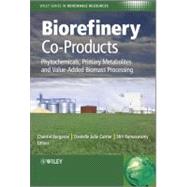
Note: Supplemental materials are not guaranteed with Rental or Used book purchases.
Purchase Benefits
What is included with this book?
Dr D. Julie Carrier is a Professor in Biological and Agricultural Engineering at the University of Arkansas. Her current research is aimed at extracting valuable chemical components from biomass. She has been working in this field for 10 years, accumulating over 50 peer-reviewed papers. In addition to her research, she teaches courses on properties of biological materials and biotechnology/bioprocessing. She has authored over 50 peer reviewed journal articles and 2 book chapters.
Danielle Julie Carrier, Department of Biological and Agricultural Engineering, University of Arkansas, Fayetteville, Arkansas, USA.
Shri Ramaswamy, Department of Bioproducts and Biosystems Engineering, Kaufert Lab, University of Minnesota, Saint Paul, Minnesota, USA.
Preface xv
List of Contributors xvii
1 An Overview of Biorefinery Technology 1
Mahmoud A. Sharara, Edgar C. Clausen and Danielle Julie Carrier
1.1 Introduction 1
1.2 Feedstock 2
1.3 Thermochemical Conversion of Biomass 4
1.4 Biochemical Conversion 10
1.5 Conclusion 15
2 Overview of the Chemistry of Primary and Secondary Plant Metabolites 19
Chantal Bergeron
2.1 Introduction 19
2.2 Primary Metabolites 20
2.3 Secondary Metabolites 23
2.4 Stability of Isolated Compounds 35
2.5 Conclusion 35
3 Separation and Purification of Phytochemicals as Co-Products in Biorefineries 37
Hua-Jiang Huang and Shri Ramaswamy
3.1 Introduction 37
3.2 Conventional Separation Approaches 39
3.3 Supercritical Fluid Extraction 45
3.4 Separation and Purification of Phytochemicals from Plant Extracts and Dilute Solution in Biorefineries 46
3.5 Summary 49
4 Phytochemicals from Corn: a Processing Perspective 55
Kent Rausch
4.1 Introduction: Corn Processes 55
4.2 Phytochemicals Found in Corn 63
4.3 Corn Processing Effects on Phytochemical Recovery 71
4.4 Conclusions 86
5 Co-Products from Cereal and Oilseed Biorefinery Systems 93
Nurhan Turgut Dunford
5.1 Introduction 93
5.2 Cereals 95
5.3 Oilseed Biorefineries 102
5.4 Conclusions 108
6 Bioactive Soy Co-Products 117
Arvind Kannan, Srinivas Rayaprolu and Navam Hettiarachchy
6.1 Introduction 117
6.2 Co-Products Obtained from Industrial Biorefineries 119
6.3 Technologies Used to Extract Co-Products 122
6.4 Bioactivities and Nutritional Value in Biorefinery Co-Products 123
6.5 Modern Technologies for Efficient Delivery – Nanoencapsulation 126
6.6 Conclusion and Future Prospects 127
7 Production of Valuable Compounds by Supercritical Technology Using Residues from Sugarcane Processing 133
Juliana M. Prado and M. Angela A. Meireles
7.1 Introduction 133
7.2 Supercritical Fluid Extraction of Filter Cake 135
7.3 Process Simulation for Estimating Manufacturing Cost of Extracts 138
7.4 Hydrolysis of Bagasse with Sub/Supercritical Fluids 143
7.5 Conclusions 148
8 Potential Value-Added Co-products from Citrus Fruit Processing 153
John A. Manthey
8.1 Introduction 153
8.2 Fruit Processing and Byproduct Streams 154
8.3 Polysaccharides as Value-Added Products 163
8.4 Phytonutrients as Value-Added Products 165
8.5 Fermentation and Production of Enhanced Byproducts 170
8.6 Conclusion 171
9 Recovery of Leaf Protein for Animal Feed and High-Value Uses 179
Bryan D. Bals, Bruce E. Dale and Venkatesh Balan
9.1 Introduction 179
9.2 Methods of Separating Protein 181
9.3 Protein Concentration 185
9.4 Uses for Leaf Protein 187
9.5 Integration with Biofuel Production 189
9.6 Conclusions 192
10 Phytochemicals from Algae 199
Liam Brennan, Anika Mostaert, Cormac Murphy and Philip Owende
10.1 Introduction 199
10.2 Commercial Applications of Algal Phytochemicals 203
10.3 Production Techniques for Algal Phytochemicals 213
10.4 Extraction Techniques for Algal Phytochemicals 220
10.5 Metabolic Engineering for Synthesis of Algae-Derived Compounds 224
10.6 Phytochemical Market Evolution 228
10.7 Conclusions 228
11 New Bioactive Natural Products from Canadian Boreal Forest 241
Francois Simard, Andre Pichette and Jean Legault
11.1 Introduction 241
11.2 Identification of New Bioactive Natural Products from Canadian Boreal Forest 243
11.3 Chemical Modification of Bioactive Natural Products from the Canadian Boreal Forest 250
11.4 Conclusion 253
12 Pressurized Fluid Extraction and Analysis of Bioactive Compounds in Birch Bark 259
Michelle Co and Charlotta Turner
12.1 Introduction 259
12.2 Qualitative Analysis of Birch Bark 261
12.3 Quantitative Analysis of Bioactive Compounds in Birch 267
12.4 High-Performance Liquid Chromatography with Diode Array, Electrochemical and Mass Spectrometric Detection of Antioxidants 270
12.5 Extraction of Bioactive Compounds 272
12.6 Discussion and Future Perspectives 278
13 Adding Value to the Integrated Forest Biorefinery with Co-Products from Hemicellulose-Rich Pre-Pulping Extract 287
Abigail S. Engelberth and G. Peter van Walsum
13.1 Introduction 287
13.2 Hemicellulose Recovery 289
13.3 Hemicellulose Conversion 295
13.4 Process Economics 305
13.5 Conclusion 306
14 Pyrolysis Bio-Oils from Temperate Forests: Fuels, Phytochemicals and Bioproducts 311
Mamdouh Abou-Zaid and Ian M. Scott
14.1 Introduction 311
14.2 Overview of Forest Feedstock 312
14.3 Pyrolysis Technology 317
14.4 Prospects for Fuel Production 317
14.5 Chemicals in the Bio-Oil 318
14.6 Valuable Chemical Recovery Process 320
14.7 Selected Phytochemicals from Pyrolysis Bio-Oils 321
14.8 Other Products 322
14.9 Future Prospects 323
15 Char from Sugarcane Bagasse 327
K. Thomas Klasson
15.1 Introduction 327
15.2 Sugarcane Bagasse Availability 330
15.3 Thermal Processing in an Inert Atmosphere (Pyrolysis) 331
15.4 Technology for Converting Char to Activated Char 332
15.5 Char and Activated-Char Characterization and Implications for Use 333
15.6 Uses of Bagasse Char and Activated Char 343
15.7 Conclusions 345
References 345
Index 351
The New copy of this book will include any supplemental materials advertised. Please check the title of the book to determine if it should include any access cards, study guides, lab manuals, CDs, etc.
The Used, Rental and eBook copies of this book are not guaranteed to include any supplemental materials. Typically, only the book itself is included. This is true even if the title states it includes any access cards, study guides, lab manuals, CDs, etc.